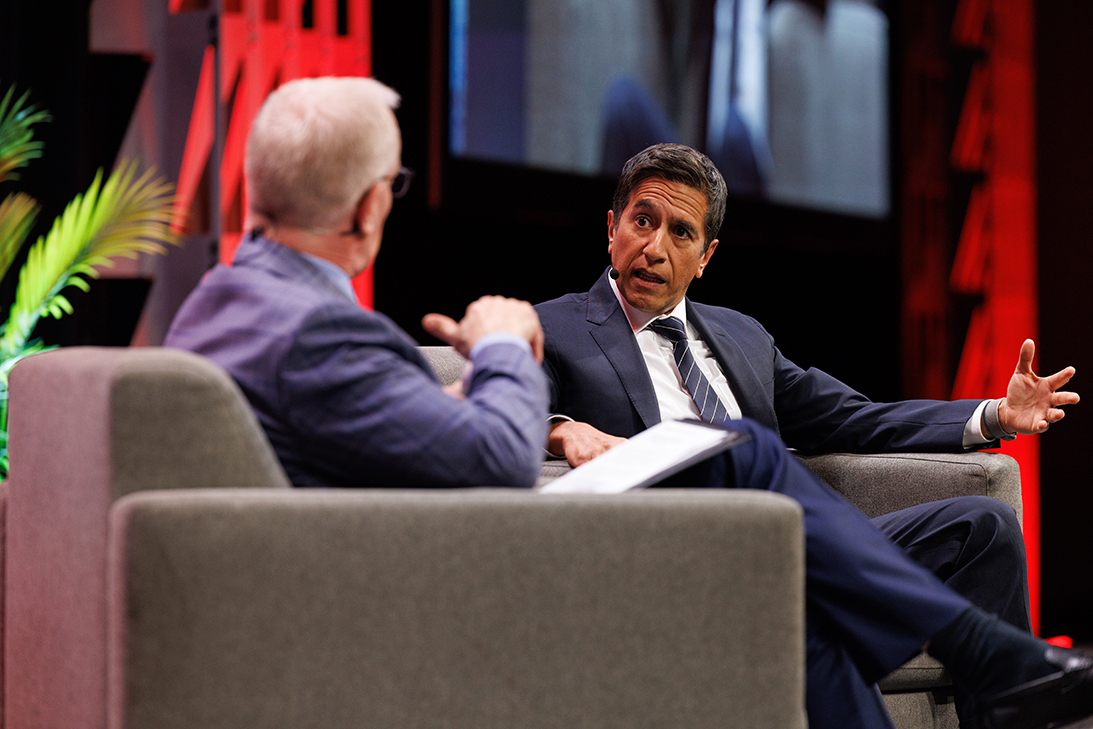
“I feel like I finally got invited to the cool kids’ table,” joked Sanjay Gupta, MD, neurosurgeon and winner of multiple Emmy Awards as chief medical correspondent for CNN, during the Your Academy event at the AAOS 2024 Annual Meeting. Dr. Gupta was the 2024 Presidential Guest Speaker for the event, where he sat down for a “fireside chat” with outgoing AAOS President Kevin J. Bozic, MD, MBA, FAAOS.
During their conversation, they discussed Dr. Gupta’s career as a physician and journalist, the ongoing mental health crisis among physicians, the application of artificial intelligence (AI) in the healthcare sector, and more.
From neurosurgeon to journalist
In 2001, Dr. Gupta joined CNN as a medical correspondent in addition to his role as associate chief of neurosurgery at Grady Memorial Hospital in Atlanta. On extending his career into journalism, Dr. Gupta referred to it as “a little bit of a circus.” As Dr. Gupta completed his training and residency, he became interested in the overall healthcare system. “I started writing about it—specifically about the United States healthcare system, other healthcare systems, drawing comparative analyses—for small magazines,” he recounted. His small start led to big things down the line, from becoming a White House Fellow in 1997 to reporting on health-related stories around the world, including the 9/11 terror attacks, the 2004 tsunami in Sri Lanka, the 2014 Ebola outbreak in Guinea, the COVID-19 pandemic, and more.
For members who may be asked to comment on controversial or politically charged health-related issues (e.g., firearm-related incidents, COVID-19, etc.), Dr. Gupta advised attendees to anticipate how events can be politicized. He noted that there is a “desire to treat medicine like a hard science,” despite the nuance that is engrained in the work that physicians do.
In addition to being clear on what one does know, Dr. Gupta emphasized being clear on what one does not know. “With scientists and doctors and other folks, there is always an inclination to fill in the silence, to fill in the gaps, to go beyond what is known and start to extrapolate and editorialize on what you think,” he said.
Not ‘burnout,’ but moral injury
“Physician burnout has become an epidemic that has had tremendous clinical and economic consequences on our health system,” Dr. Bozic noted, before asking Dr. Gupta to share his own thoughts on factors driving this crisis. According to Dr. Gupta, the subject of burnout could be discussed on individual, systemic, and societal levels, but he ultimately chose to answer Dr. Bozic’s question with a question of his own: “Is burnout really the right word?”
To Dr. Gupta, the issue is less about burnout and more related to moral injustices inflicted on physicians. The long ledger of miscellaneous tasks and barriers—including administrative burdens, insurance issues, patient satisfaction scores, and concerns about financial security—pull physicians away from the ability to do their jobs.
“Those moral injustices really start to build up,” he said, “and they can lead to moral injury.” Although hospital systems may place heavy emphasis on patient satisfaction scores, Dr. Gupta asserted that “clinician satisfaction scores are important as well.”
AI: separating the hype from the reality
Regarding the application and general enthusiasm regarding AI, Dr. Gupta acknowledged the slow pace of real-world application of this technology, which has not manifested at the same speed as the hype would suggest. This disconnect is generally the case with any new technology, Dr. Gupta said. “It takes time for it to be implemented in a way that’s meaningful.”
Despite the slower-than-expected unfurling of AI, Dr. Gupta remained optimistic about its application in science. He anticipates AI to slowly insert itself into the day-to-day lives of physicians and patients. AI in healthcare can create many efficiencies, he noted; however, “I think in healthcare, AI is always going to be part of a trust-but-verify model,” Dr. Gupta cautioned.
‘You’re a human first’
Drs. Bozic and Gupta closed Your Academy 2024 by discussing Dr. Gupta’s medical and journalistic work in dangerous settings around the world, such as active war zones and sites of natural disasters. “In those moments, you’re a journalist, but you’re a human first,” Dr. Gupta said.
Although the work he accomplished was notable, Dr. Gupta made sure to give credit where credit is due—to the teammates who supported him in the clinic and in the field. Whether or not one’s team members can help with the physical tasks at hand, they “can help you keep your head on straight,” he said. He concluded by recalling an impromptu craniotomy he was called on to perform on a young soldier in Afghanistan. It was not until months later that Dr. Gupta met the young soldier who, aside from a slight weakness in his left hand, was healthy at home with his family. “It was one of the most meaningful moments in my life,” he said.
Cailin Conner is the associate editor for AAOS Now. She can be reached at cconner@aaos.org.